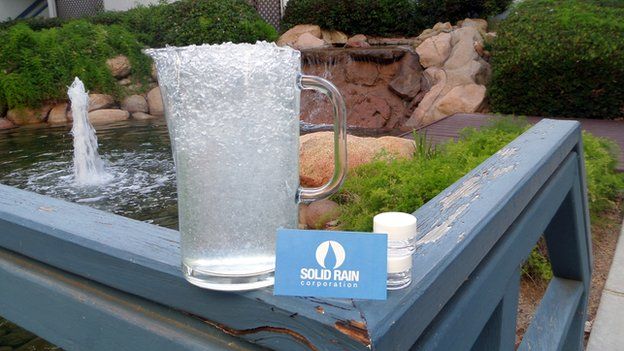Can 'powdered rain' make drought a thing of the past?
- Published
- comments

The lack of water is a growing, global problem that seems intractable.
While the UN estimates that a large majority of the water we use goes on irrigation, researchers have been working on a range of ideas that make the water we use in agriculture last longer.
There has been a great deal of excitement and some dramatic headlines in recent weeks about a product that is said to have the potential to overcome the global challenge of growing crops in arid conditions.
"Solid Rain" is a powder that's capable of absorbing enormous amounts of water and releasing it slowly over a year so that plants can survive and thrive in the middle of a drought.
A litre of water can be absorbed in as little as 10 grams of the material, which is a type of absorbent polymer originally pioneered by the US Department of Agriculture (USDA).
Back in the 1970s, USDA developed a super-absorbent product made from a type of starch nicknamed the "super slurper".
The most widely used, commercial application of this technology has been in disposable nappies, or diapers as they are quaintly termed in the US.
But a Mexican chemical engineer called Sergio Jesus Rico Velasco saw more in the product than dry bottoms.
He developed and patented a different version of the formula that could be mixed in with soil to hold water that could then slowly feed plants.
Ground water
He formed a company to sell Solid Rain and it has quietly been selling the product in Mexico for around 10 years. The company says that the government there tested Solid Rain and found that crop yields could increase by 300% when it was added to the soil.
According to Edwin Gonzalez, a vice president with the Solid Rain company, the product is now attracting wider interest because of growing concerns about the scarcity of water.
"It works by encapsulating the water, and our product lasts 8 to 10 years in the ground, depending on the water quality - if you use pure water, it lasts longer," he told BBC News.
The company recommends using about 50kgs per hectare - though it's not cheap, at $1,500 (£960) for that amount.
Mr Gonzalez was at pains to point out that Solid Rain was all natural and would not damage the land even if it was used for several years.
"Our product is not toxic; it's made from a bio-acrylamide. After it disintegrates, the powder-like substance becomes part of the plant - it is not toxic," he said.
Science uncertain
But not everyone is convinced that Solid Rain is a significant solution to the problem of drought.
Dr Linda Chalker-Scott from Washington State University says that these types of products have been known to gardeners for several years now.
"They're hardly new, and there's no scientific evidence to suggest that they hold water for a year, or last for 10 years in the soil," she told BBC News.
"An additional practical problem is that gels can do as much harm as good. As the gels begin to dry out, they soak up surrounding water more vigorously. That means they will start taking water directly from plant roots," she added.
Dr Chalker-Scott says that research she carried out in Seattle with newly transplanted trees showed that wood chip mulching was just as effective as adding powdered materials and gels to the soil. And it was significantly cheaper.
However, Edwin Gonzalez says Solid Rain is different.
"There are other competitors that last three or four years. The ones that don't last as long are the ones that have sodium - they don't absorb as much. The potassium ones, like ours, are seen as the better products," he said
Despite the fact that the science may not be entirely certain about the benefits of products like this, Edwin Gonzalez says his company has been inundated with enquiries from dry spots including India and Australia.
And he's also had several orders from the UK, where the lack of water is usually not a problem.
Follow Matt on Twitter.
- Published26 July 2013
- Published10 August 2013
- Published18 August 2013